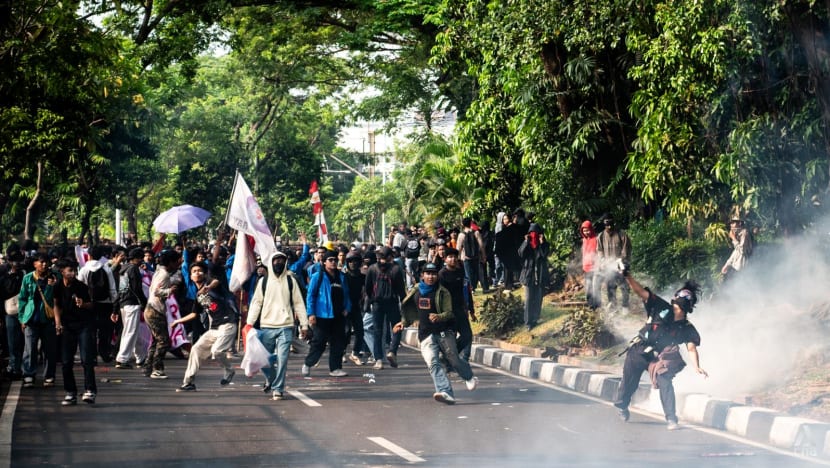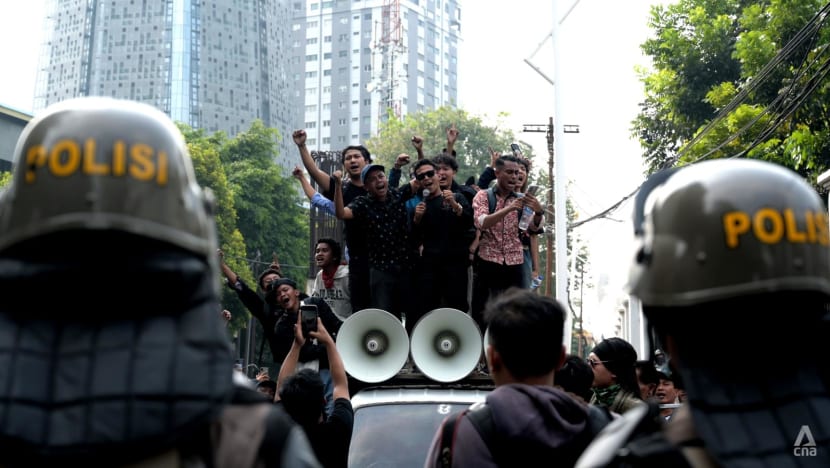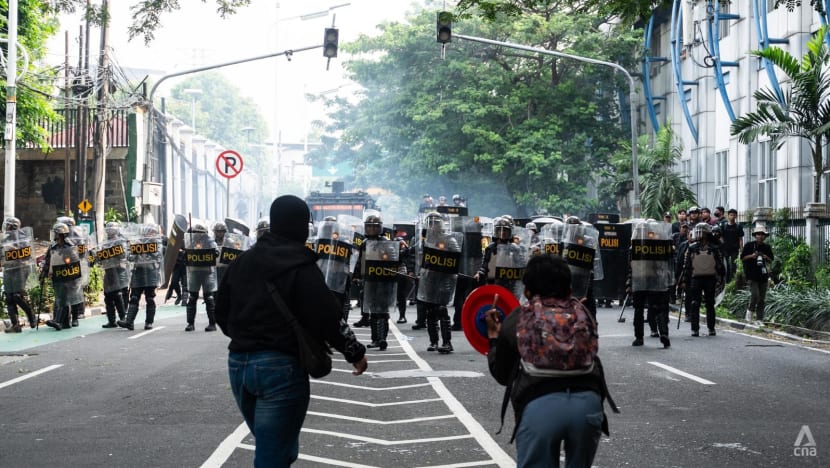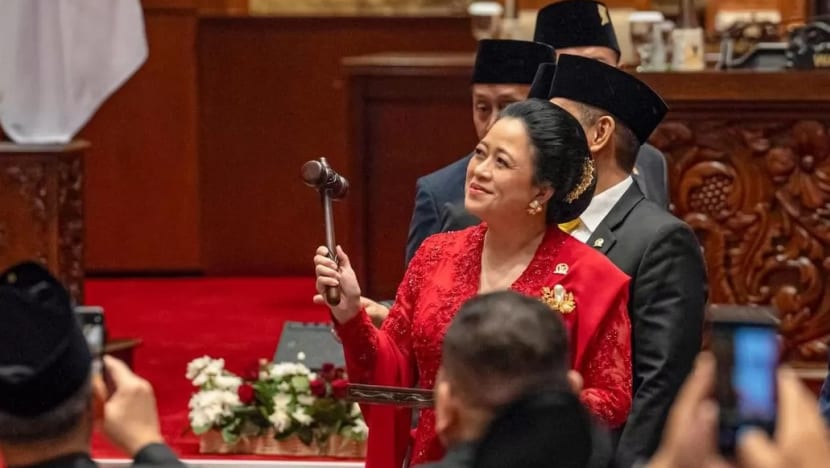Protesters in Indonesia slam new US$3,000 monthly housing perk for MPs, who defend it as ‘carefully calculated’
The controversy comes just days after President Prabowo Subianto pledged further austerity measures to finance his government’s ambitious programmes.

Hundreds of protesters rally in Jakarta's Senayan district on Aug 25, 2025 to oppose new and increased allowances given to lawmakers. (Photo: CNA/Wisnu Agung Prasetyo)

This audio is generated by an AI tool.
JAKARTA: Hundreds of Indonesians took to the streets on Monday (Aug 25) to protest perks such as new and increased monthly allowances for Members of Parliament (MPs) at a time of economic uncertainty and government austerity measures.
A new monthly housing allowance of 50 million rupiah (US$3,075) for MPs is almost 10 times the minimum wage in Indonesia’s capital and biggest city, Jakarta.
Announced last Tuesday, mere days after President Prabowo Subianto promised strict austerity measures and more efficient government spending, the allowance was deemed “insensitive” by experts and average Indonesians.
After days of venting their discontent on social media, hundreds of Indonesians from student groups and other organisations decided to protest outside the parliament building in Jakarta.
The protesters also demanded the repeal of a number of laws, such as one expanding the role of the military in governance.
The demonstrators attempted to breach metal and concrete barriers, prompting the authorities to respond with tear gas and water cannon.


Some participants said they joined out of frustration over lawmakers’ apparent disregard for ordinary citizens’ struggles.
“It’s really heartbreaking. Many people still earn less than 50,000 rupiah a day. They should see that the condition of Indonesian society right now is dire,” university student Ivan told CNA.
Another protester, Zico, echoed the sentiment: “Instead of allowances (for MPs), the money should be used to increase teachers’ salaries so they can live decently or to create jobs."
Salaries for teachers in the country range from 1.2 million to 7 million rupiah a month.
At around noon, police personnel in Jakarta managed to hold back protesters some 500m away from the parliament’s main gate, but the demonstrators regrouped hours later. At around 3pm, they tried to push their way through again and were once more met with tear gas.
It is not clear whether anyone was arrested or injured during the protest. The demonstration in Jakarta caused several streets to be shut down and train and bus services to be suspended for several hours.
Protesters in other cities across Indonesia also staged parallel demonstrations on Monday.
JUSTIFIED SPENDING?
The MPs’ allowance was announced by Adies Kadir, deputy speaker of the House of Representatives, days after Prabowo revealed next year’s budget in his first State of the Nation address on Aug 15.
Adies was responding to questions from journalists on whether parliament would see an increased budget next year. Indonesia has a total of 580 members in its House of Representatives, its more powerful lower chamber.
House of Representatives secretary-general Indra Iskandar had said in October last year that current MPs would no longer be provided with official residences as the condition of many of the residences had deteriorated and were no longer habitable.
They were previously housed in a gated housing complex built in the late 1980s, some 10km from the parliament building.
MPs had petitioned to be given a cash allowance, and Indra said at the time the amount to be given as housing allowance was under review.
The lawmakers will also receive a rice allowance increase from 10 million rupiah to 12 million rupiah per month, and fuel allowances rising from 5 million rupiah to 7 million rupiah per month.
“The finance minister also felt sorry for our fellow MPs. That’s why the allowances were increased, and we thank her for that,” Adies said last week, adding, “only the allowances I mentioned earlier were raised”.
Even without the housing allowance, MPs already earn up to 230 million rupiah per month from other allowances and attendance bonuses they are entitled to, according to transparency advocacy group Fitra.
The public backlash was almost immediate.
On social media, TikTok and Instagram users shared videos juxtaposing commuters on cramped buses and trains with footage of MPs laughing and dancing during the State of the Nation address. On Twitter, the hashtag #bubarkanDPR or “disband the parliament” trended.
Some lawmakers defended the allowance.
Singer-turned-MP Sigit Purnomo, better known by his stage name Pasha Ungu, said the decision was made carefully by both executive and legislative branches of the government.
“Everything has been calculated carefully. What are the needs of MPs? How does it fit with the government’s finances? Does it make sense or not?” he said, as quoted by news outlet Kompas on Monday.
Even lawmakers from the Indonesian Democratic Party of Struggle (PDI-P), one of just two political parties outside of Prabowo’s ruling coalition, supported the allowances.
“(The figure) has been calculated well and adjusted to the conditions and prices in Jakarta," PDI-P stalwart and parliament speaker Puan Maharani said on Aug 21, as quoted by Tempo.

Critics argue the 50 million rupiah monthly stipend is excessive.
A property analyst told Detik news portal on Aug 21 that the amount is equivalent to renting a luxury 700sqm home complete with marble floors, a pool and a garage for four cars in Jakarta’s most exclusive areas.
Media Wahyudi Askar, an economist from the think tank Center for Economic and Legal Studies (CELIOS), called the move “irrational”, arguing the funds would be better spent on economic stimulus or preventing local tax hikes.
“Furthermore, allowances should be tied to measurable performance such as attendance, legislation quality, and more oversight of the government,” he told CNA.
Achmad Nur Hidayat, an economics and public policy lecturer from National Development University, said it is time for Indonesia’s parliament to merge its fragmented pay structure and cap allowances for items like housing and vehicles.
“Limit them with realistic ceilings based on reimbursement and proof of spending,” he said. “The 50 million rupiah monthly housing plan should be tested for urgency and efficiency before going ahead.”
WILL HOUSING ALLOWANCE GO AHEAD?
The controversy comes just days after Prabowo, in his State of the Nation address, pledged further austerity to finance his government’s ambitious programmes.
He said that 2025 budget cuts had saved 300 trillion rupiah, which helped fund his many ambitious programmes such as the free-meal initiative, which alone costs taxpayers 335 trillion rupiah every year.
The Finance Ministry predicted the free-meal initiative, along with other programmes such as free health checks and free boarding school enrolment for children from poor families, would cause a government deficit of around US$40 billion, or 2.7 per cent of the country’s gross domestic product by the end of 2025.
Prabowo said his austerity measures would close the budget deficit to around 2.48 per cent of the GDP next year.
“My hope is to one day, be it 2027 or 2028, I stand before this plenary to say that we have managed to have a state budget without a deficit,” Prabowo told parliament on Aug 15.
Analysts suggested the increase in MPs’ allowance could reflect Prabowo’s need for political and parliamentary support for his programmes.
“Parliament was given privileges in the form of higher allowances (possibly because) Prabowo doesn’t want his programmes vetoed or politically disrupted,” Kunto Adi Wibowo, a political observer from Padjadjaran University, told CNA.
Although Prabowo has in the past rolled back unpopular policies such as a proposed value added tax (VAT) hike or limits on subsidised cooking gas, experts said it could be different this time.
“Because the government also wants (parliament’s) support for its policies, it will be difficult for Prabowo to cancel this allowance hike,” Hendri Satrio of Paramadina University told CNA.
“But the people have voiced their objections. That’s important, because it will force Prabowo to be more careful in the future about raising MPs’ benefits without real parliamentary work that benefits the public.”
Additional reporting by Wisnu Agung Prasetyo


















